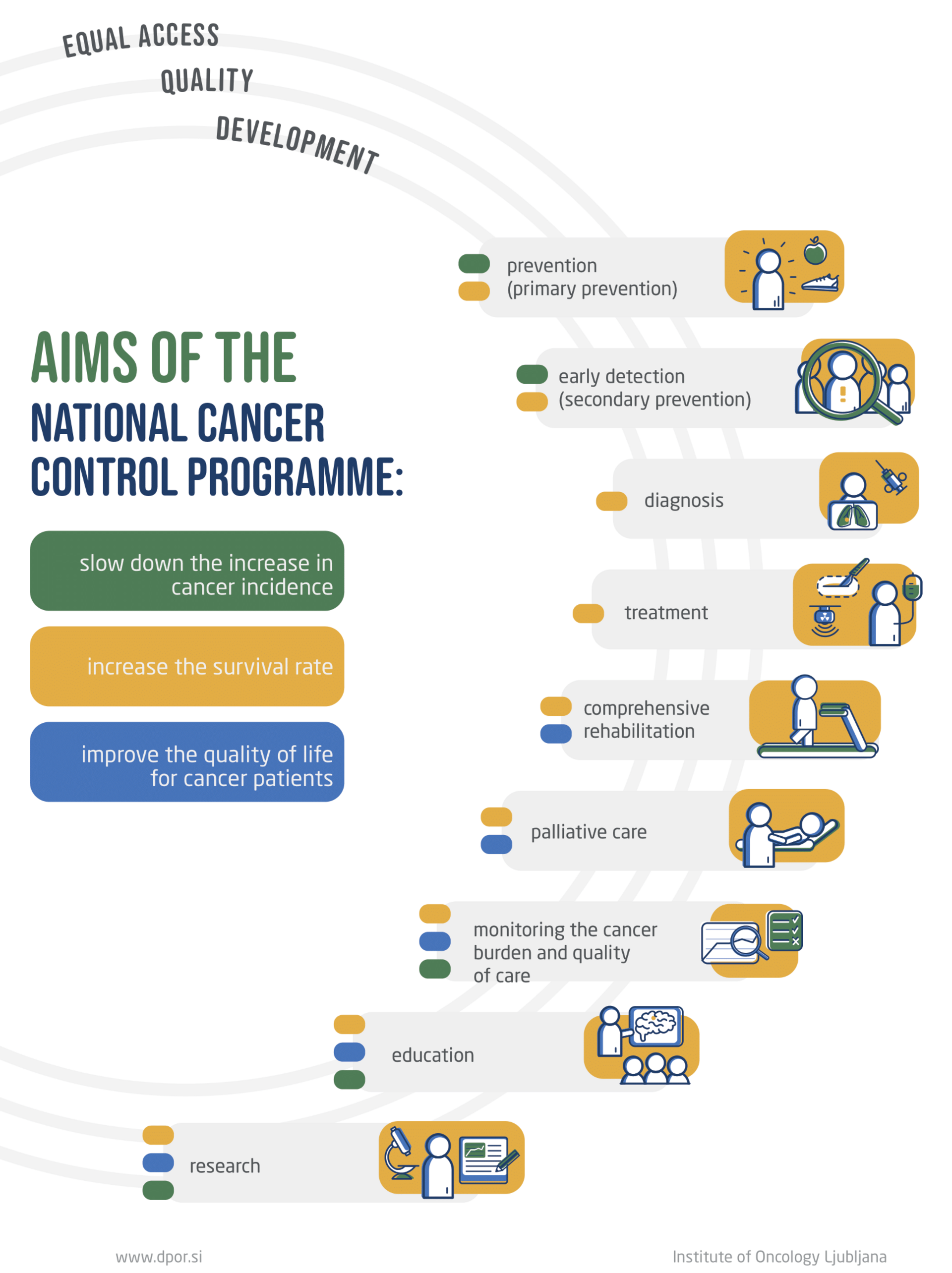About us
National Cancer Control Programme
The National Cancer Control Programme (NCCP) outlines the essential activities, tasks, and measures necessary for effective cancer control in Slovenia. Grounded in international recommendations, the NCCP is tailored to the healthcare system of the Republic of Slovenia, striving to achieve that all citizens have equal access to high-quality cancer-related healthcare services. It reflects the perspectives of healthcare policymakers, medical professionals, and civil society in addressing the challenges of cancer control.
The Ministry of Health oversees the NCCP, while the Institute of Oncology Ljubljana is responsible for its management, communication and implementation. The current document, NCCP 2022–2026, builds on the achievements of its predecessors, NCCP 2010–2015 and NCCP 2017–2021, all of which have been adopted by the Government of the Republic of Slovenia. This programme aligns with Europe’s Beating Cancer Plan and aims to strengthen Slovenia’s comprehensive approach to cancer control.
Over a decade ago, in 2008, Slovenia recognized the need for a strategic document that unites the efforts of all healthcare levels and acknowledges the contributions of various stakeholders in cancer control. Previous programmes focused primarily on primary prevention and the establishment of evidence-based, EU-recommended screening programs. In contrast, the 2022–2026 focus shifts to improving care quality and enhancing the quality of life for cancer patients.
To monitor care quality, Slovenia is establishing clinical registries for the most common cancers. The data collected will drive systemic changes aimed at providing the highest possible quality of care for all citizens. A critical aspect of the programme is enhancing patients' quality of life by promoting comprehensive rehabilitation from the point of diagnosis. This approach facilitates early and optimal re-integration into active social life. Furthermore, the emphasis on palliative care ensures accessibility early in the disease course for all who need it.
Throughout the 2022–2026 period, the NCCP modernizes its management and performance monitoring processes. This modernization enhances the implementation of activities and enables swift responses to any deviations from planned objectives. It allows for more effective tracking of performance and necessary adjustments to ensure that goals are met.
Strategic Goals for the NCCP 2022–2026
1. Slow Down the Increase in Cancer Incidence
This goal is monitored through the age-standardised incidence rate, using 2022 as the baseline year. The targets are:
- Men: Sustain an annual downward trend of 0.3%.
- Women: Reduce the annual growth rate to 1%.
2. Increase the Survival Rate
Progress is tracked via the five-year relative survival rate, aiming for a 3% improvement during 2022–2026 compared to the previous period of 2017–2021.
3. Improve the Quality of Life for Cancer Patients
The NCCP 2022–2026 introduces national-level indicators to monitor and enhance the quality of life for cancer patients through comprehensive rehabilitation and palliative care.
The overarching aim of the NCCP is to ensure equal access to quality healthcare services at all levels, encompassing prevention, diagnosis, treatment, rehabilitation, palliative care, research, and education. To achieve this, the NCCP 2022–2026 defines clear strategic and specific goals, including:
Specific Objectives:
- Prevention: Elevate the significance and scope of prevention activities, ensuring that all target groups have access to screening programs and expanding primary and secondary prevention initiatives.
- Diagnosis and Treatment: Improve the organization of oncology care at the primary, secondary, and tertiary levels, increasing human resources and enhancing the availability of diagnostic equipment and treatment options.
- Comprehensive Rehabilitation: Guarantee that cancer patients have access to comprehensive rehabilitation services from the moment of diagnosis, facilitating their re-integration into active social life.
- Palliative Care: Provide high-quality palliative care nationwide, ensuring it is accessible early in the disease course for all who need it, consistent with the 2010 National Programme for Palliative Care.
- Research and Education: Strengthen research initiatives and improve education for healthcare professionals at all levels, promoting ongoing learning in oncology.
- Monitoring and Quality of Care: Implement continuous nationwide monitoring of cancer burden data and care quality, ensuring that improvements are tracked and systemic changes are proposed based on findings.
- Programme Management: Establish a stable structure and resources for the NCCP, including expert guidelines, quality indicator monitoring, comprehensive information dissemination among professionals, general public and stakeholders beyond health sector.
By modernizing performance tracking and emphasizing prevention, care quality, and rehabilitation, the NCCP 2022–2026 aims to effectively reduce the cancer burden in Slovenia and improve outcomes for patients.


